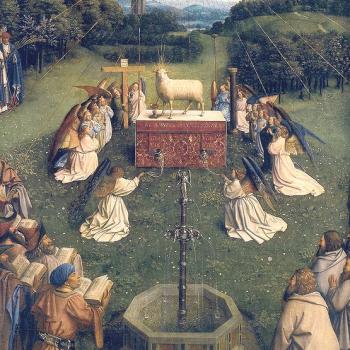
From my book, The Catholic Verses (Sophia Institute Press, 2004, pp. 124-126).
*****
1 Corinthians 11:27-30: “Whoever, therefore, eats the bread or drinks the cup of the Lord in an unworthy manner will be guilty of profaning the body and blood of the Lord. Let a man examine himself, and so eat of the bread and drink of the cup. For anyone who eats and drinks without discerning the body eats and drinks judgment upon himself. That is why many of you are weak and ill, and some have died.”
St. Paul hints at the sacredness of the Eucharist when he warns (using extremely strong language) of the consequences of receiving it without reverence and discernment. The implication is quite clear: something more than mere bread and wine, more than a pleasant “memorial meal,” is going on here.
But again, many Protestants today have lost the sacramental outlook of Martin Luther (and to a lesser extent, even of John Calvin). Baptist apologist James White provides a contemporary version of Zwinglian symbolism:
Participation in the Supper is meant to be a memorial (not a sacrifice) of the death of Christ, not the carefree and impious party it had become at Corinth (The Roman Catholic Controversy. Minneapolis: Bethany House Publishers, 1996, 175).
Martin Luther would have a great problem with such reasoning, and in refuting it, he closely approximates what a Catholic response would be. He argues that it is pointless for St. Paul to speak of sin here (“profaning” in the text) if Jesus “is not present in the eating of the bread” and that “the nature and character of the sentence requires” this “clear” interpretation. Luther sums up his exegetical argument:
It is not sound reasoning arbitrarily to associate the sin which St. Paul attributes to eating with remembrance of Christ, of which Paul does not speak. For he does not say, “Who unworthily holds the Lord in remembrance,” but “Who unworthily eats and drinks” (Against the Heavenly Prophets in the Matter of Images and Sacraments, 1525; Luther’s Works, Vol. 40, 183-184).
I prefer what is often called the “superstition” of Martin Luther, St. Augustine, and the Fathers of the Church, as it seems to be far and away the most natural reading of all these texts. Augustine wrote:
[I]t is the Body of the Lord and the Blood of the Lord even in those to whom the Apostle said: “Whoever eats and drinks unworthily, eats and drinks judgment to himself” (Baptism, 5, 8, 9; in William A. Jurgens, editor and translator. The Faith of the Early Fathers. 3 vols. Collegeville, Minnesota: The Liturgical Press, 1979, Vol. III, 68).
The eucharistic “Catholic verses” are some of the most important in the entire Catholic exegetical and apologetic arsenal. In order to avoid their clear meaning, Protestants must skirt them, special plead, and read their own prior biases into texts. This is, of course, all contrary to the usual Protestant acknowledgment that Scripture is to be interpreted literally unless the text clearly indicates otherwise.
These passages are so compelling that they played a crucial role in producing a nearly unanimous patristic acceptance of the Real Presence in the Eucharist. Several major Protestant Church historians and experts on history of Christian doctrine note this (e.g., Otto W. Heick, Williston Walker, Philip Schaff, Jaroslav Pelikan, and Carl Volz). The historical facts on this point are indisputable. As just one representative statement, I cite J. N. D. Kelly, perhaps the most-cited patristics scholar:
One could multiply texts like these which show Augustine taking for granted the traditional identification of the elements with the sacred body and blood. There can be no doubt that he shared the realism held by almost all of his contemporaries and predecessors (Early Christian Doctrines. San Francisco: Harper and Row, 1978, 447).
Catholics need not be shy in defending the Real Presence of Christ in the Eucharist. The biblical evidence is very strong, and so is the history of the beliefs of the early Christians on this score. We have nothing to fear, and we can decisively win this battle of “competing eucharistic theologies” on the field of Scripture and history alike.
***
Photo credit: The Apostle Paul (c. 1657), by Rembrandt (1606-1669) [public domain / Wikimedia Commons]
***
















